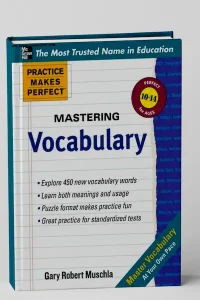Practice Makes Perfect: Mastering Vocabulary gives your child bite-sized explanations of the subject, with engaging exercises that keep her or him motivated and excited to learn.
Practice Makes Perfect Mastering Vocabulary
Having a strong grasp of vocabulary is essential for your child to read and write with confidence.
Practice Makes Perfect: Mastering Vocabulary gives your child bite-sized explanations of the subject, with engaging exercises that keep her or him motivated and excited to learn. They can practice the vocabulary they find challenging, polish skills they’ve mastered, and stretch themselves to explore skills they have not yet attempted. This book features 450 words that increase in difficulty as your child proceeds through it.
This book is appropriate for a 6th grade student working above his or her grade level, or as a great review and practice for a struggling 7th or 8th grader.
Your student will learn how to:
- Apply vocabulary rules
- Understand meaning and usage
- Differentiate between synonyms, antonyms, homophones, and more
- Conquer easily confused words
About The Book
Words are the foundation of reading, speaking, and writing. It is through words that we share ideas and learn new things. Your understanding and use of words—your vocabulary—relate directly to learning. Students who have rich vocabularies usually do better in school than students whose vocabularies are poor.
The lessons in this book provide more than 450 words that are found in sixth, seventh, and eighth-grade curriculums. The definitions of these words include more words that can expand your vocabulary even further. Many of the words throughout this book appear on standardized tests.
Practice Makes Perfect: Mastering Vocabulary can be a helpful resource for learning the meanings and uses of words. It can be used by both students and teachers. Students (working alone or with their parents) can complete the lessons, while teachers will find the materials of the book useful for classroom instruction.
Having a broad vocabulary is a key to being successful in school and beyond. It is my hope that this book will make your study of vocabulary an enjoyable experience.
How to Use This Book
Practice Makes Perfect: Mastering Vocabulary contains forty lessons. Each lesson focuses on a particular type of word or word group and includes a list of words and three practice worksheets. An alphabetical list of the words in the lessons and an answer key for the worksheets conclude the book.
The first page of each lesson presents words you should know. Most lessons present ten words, but a few present more. For most lessons, words are shown with their part of speech, definition, and a sample sentence. A Vocabulary Tip is included at the bottom of the page. You should study the list of words and their definitions for each lesson before trying to do the worksheets. Use your dictionary to check the meanings of any words in the definitions that are new to you. Learning these words, along with the words presented in the lesson, will expand your vocabulary greatly.
The worksheets are designed to make learning vocabulary easy and fun. Each worksheet begins with a question that you can answer by completing the worksheet correctly. Try to complete the worksheets without looking back at the definitions of the list words. Look back only if you need help.
Completing the worksheets in this book will help you to expand your vocabulary. But there are many other ways you can learn new words and their meanings:
- Read. Reading builds vocabulary. Read different kinds of selections: novels, short stories, nonfiction books, and magazines. Make reading a habit.
- Use context clues to find the meanings of new words. You can often figure out the meaning of a word by the way it is used in a sentence. Look for clues in the following:
- Examples that give the meaning of a new word.
- Familiar words and phrases that hint at the meaning of a new word.
- Phrases after new words that contain their definitions.
- Synonyms and antonyms that help you to understand the meanings of new words.
- When necessary, use a dictionary to find the meanings of new words.
- When you learn a new word, note if it has multiple meanings. Many words do. Try to learn the different meanings of new words.
- Learn the meanings of prefixes and suffixes. Prefixes and suffixes alter the meanings of words. Use your understanding of prefixes and suffixes to help you understand the meanings of the words to which they are attached.
- When you learn a new word, repeat it and its meaning silently to yourself. Think of how the word is related to other words. This will help you to remember it.
- Think of a new word’s synonyms and antonyms. This will broaden your understanding of the word.
- Write down new words and their meanings in a “New Words” notebook. Review your notebook from time to time to refresh your memory.
- Use a thesaurus to find the synonyms of words.
- Do word games such as crossword puzzles.
- Look for new words wherever you go, every day, and in every subject in school.
As soon as you learn new words, make them a part of your vocabulary. Use them in your speaking, reading, and writing.
Check out Practice Makes Perfect Exploring Vocabulary


